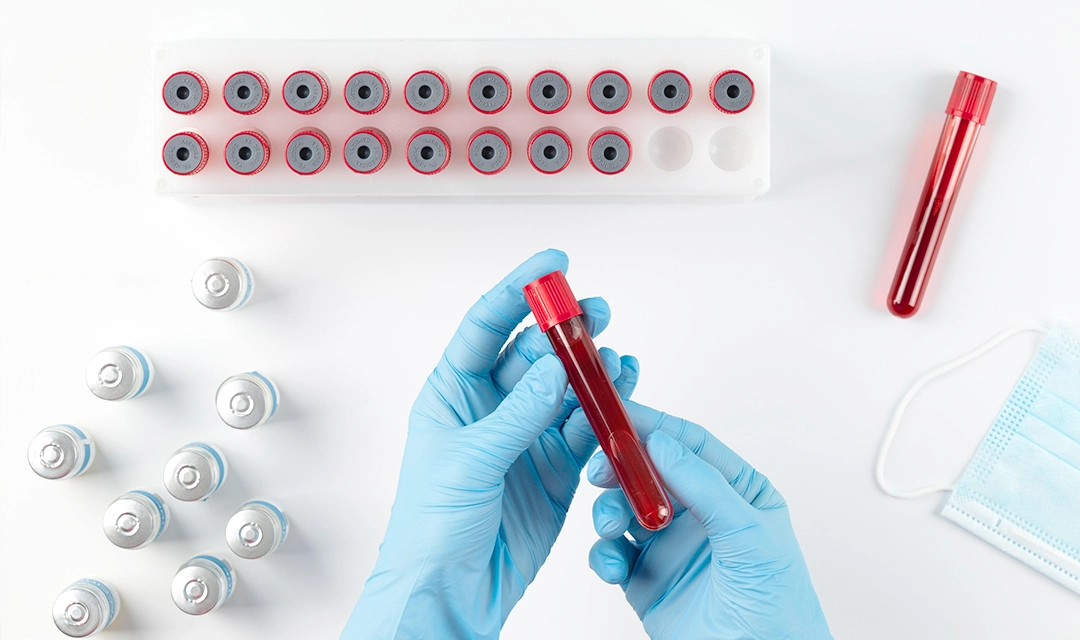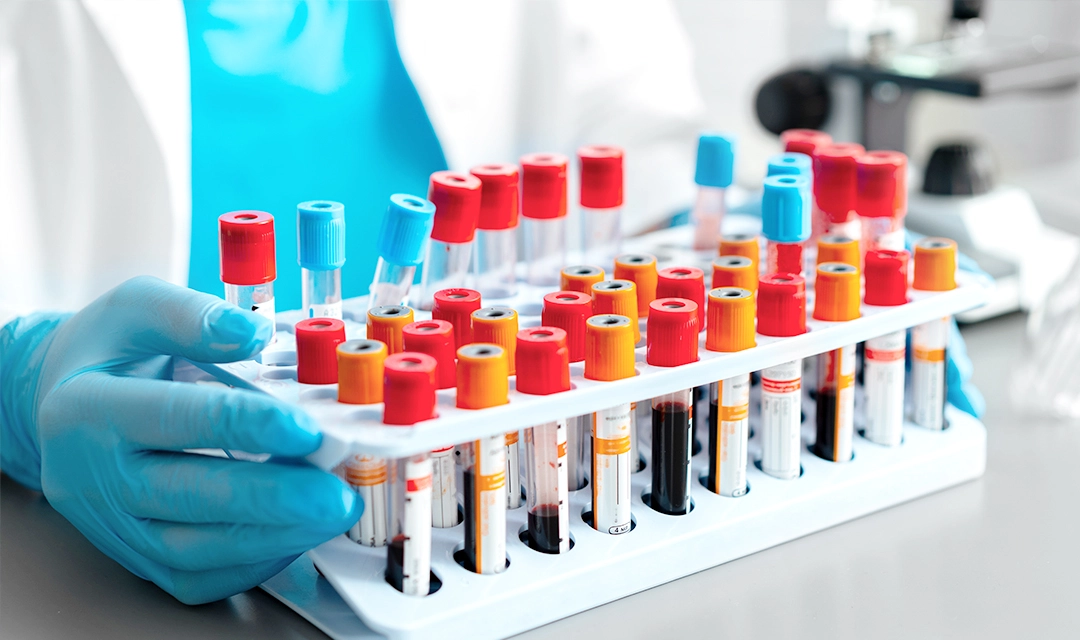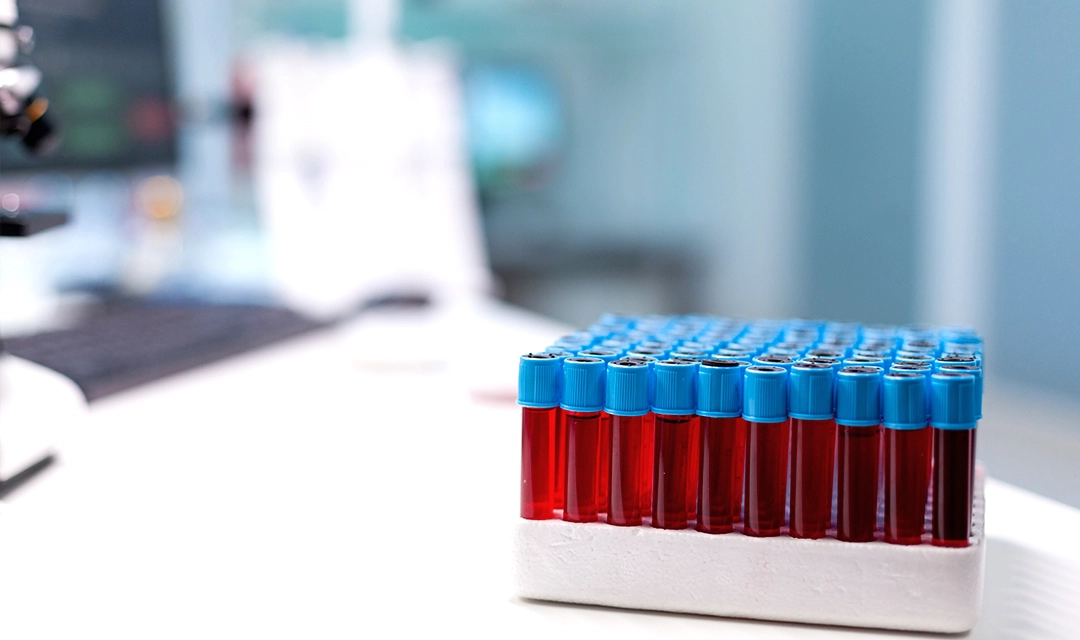- +1 (408)580-1396
- info@ibiospecimen.com
FFPE Blocks for Research in North Carolina
Human Biospecimens
FFPE Blocks for Research in North Carolina
In North Carolina, within the iBioSpecimen supplier network, you can access top-notch FFPE blocks sourced globally. These blocks follow current clinical research requirements and patient data regulations.
Throughout our network, FFPE blocks are harvested with IRB-approved protocols, ensuring uniformity and excellence. All samples meet established standards. Explore our collection of authorized FFPE blocks for research through exemption. These versatile tissue samples drive research in oncology, hematology, and immunology, notably in reproducibility, usability, and IHC testing.
Whether your focus is research, drug discovery, or diagnostics in North Carolina, our FFPE blocks cater to all your needs.
Do you require specific FFPE Blocks for Sale in North Carolina? Feel free to inform us.

Finding the Right FFPE Blocks for Research in North Carolina
iBioSpecimen Marketplace is a fast, compliant, revolutionary one-stop access to millions of FFPE blocks for sale in North Carolina and patients from a diverse network of providers.
What types of research projects typically use FFPE blocks in North Carolina?
FFPE (Formalin-Fixed Paraffin-Embedded) blocks are commonly used in various research projects in North Carolina. These blocks are derived from tissue samples that have been preserved using formalin and embedded in paraffin wax. This method allows long-term storage of tissue samples, which can be utilized for a wide range of research purposes. Here are some examples of research projects that typically use FFPE blocks in North Carolina:
- Cancer Research: FFPE blocks are extensively used in cancer research to study the molecular and genetic changes associated with various types of tumors. These blocks enable researchers to analyze the DNA, RNA, and protein expression patterns in tumor samples, helping to advance the understanding and treatment of different cancers.
- Biomarker Discovery: FFPE blocks are valuable resources for identifying and validating biomarkers, which are specific molecules that indicate the presence or progression of a particular disease. By analyzing the tissue samples preserved in FFPE blocks, researchers can identify potential biomarkers for diagnosing diseases, predicting treatment response, and monitoring disease progression.
- Pharmacogenomics: FFPE blocks are used in pharmacogenomic studies to investigate the relationship between genetic variations and drug response. Researchers can analyze the genetic material in FFPE blocks to determine how an individual’s genetic makeup influences their response to specific medications. This information can guide personalized medicine and optimize drug treatments.
- Infectious Disease Research: FFPE blocks are also employed in studying infectious diseases. Researchers can extract genetic material from FFPE blocks to identify and characterize pathogens, such as viruses or bacteria, responsible for the disease. This can help in understanding the epidemiology of infectious diseases and developing strategies for prevention and treatment.
- Genetic Research: FFPE blocks are utilized in genetic research to analyze the genetic material of individuals or populations. Researchers can study genetic mutations, polymorphisms, or gene expression patterns in preserved tissue samples. This can provide insights into the genetic basis of diseases and contribute to the development of personalized medicine approaches.
- Histopathology Studies: FFPE blocks are commonly used in histopathology studies, which involve the examination of tissue samples under a microscope to assess changes or abnormalities. These blocks allow researchers to analyze the cellular and tissue structures, which can aid in diagnosing diseases or monitoring treatment effectiveness.
In conclusion, FFPE blocks are valuable resources in various research projects in North Carolina. Their ability to preserve tissue samples long-term allows researchers to study molecular, genetic, and histological aspects of diseases and conditions. Whether it is cancer research, biomarker discovery, pharmacogenomics, infectious disease research, genetic research, or histopathology studies, FFPE blocks play a crucial role in advancing scientific knowledge and improving diagnostic and treatment approaches.
Are there any FFPE block providers in North Carolina?
Yes, there are several FFPE block providers in North Carolina. FFPE stands for Formalin-Fixed Paraffin-Embedded, which is a common method of preserving tissue samples for histological analysis. These providers offer FFPE blocks that can be used for various diagnostic purposes, including genetic testing, cancer research, and pathology studies.
One reputable FFPE block provider in North Carolina is iBioSpecimen. They specialize in producing high-quality FFPE blocks from a wide range of tissue samples. Their blocks are processed following standardized protocols to ensure accuracy and reliability of the results. iBioSpecimen also offers additional services such as DNA and RNA extraction, immunohistochemistry staining, and molecular analysis.
Are FFPE blocks available for purchase in North Carolina?
FFPE blocks, also known as formalin-fixed paraffin-embedded blocks, are commonly used in diagnostic procedures, including blood tests, in order to preserve and store tissue samples. While it is possible to purchase FFPE blocks in many places, including medical supply companies, it is important to note that they are not typically sold directly to individual patients.
In the state of North Carolina, FFPE blocks can be obtained through various medical institutions, such as hospitals, clinics, and laboratories. These institutions typically collect and process tissue samples for diagnostic purposes. If you require a blood test that involves the use of FFPE blocks, it is recommended to consult with your healthcare provider or the medical institution where the test will be conducted.
Your healthcare provider will be able to guide you on the necessary steps to obtain an FFPE block for your specific diagnostic needs. They will assess your medical condition, order the appropriate tests, and coordinate with the laboratory or facility that will handle the sample processing.
It is important to note that FFPE blocks are not available for purchase directly by patients due to the specialized equipment and expertise required for their preparation and handling. These blocks are typically produced and handled under regulated laboratory conditions to ensure proper preservation and accurate diagnostic results.
Are there any quality assurance measures for FFPE blocks sold in North Carolina?
Yes, there are quality assurance measures in place for FFPE blocks sold in North Carolina. FFPE stands for formalin-fixed paraffin-embedded, which is a method used to preserve tissue samples for analysis.
In North Carolina, as in most states, the sale of FFPE blocks for diagnostic purposes is regulated by various organizations to ensure quality and reliability. One of the key regulatory bodies involved in this process is the North Carolina Department of Public Health (ADPH). They have established guidelines and protocols for the collection, preservation, and sale of FFPE blocks in the state.
Additionally, laboratories and medical facilities that sell FFPE blocks in North Carolina are required to adhere to certain quality assurance measures. These measures may include maintaining proper documentation for the handling and storage of FFPE blocks, ensuring proper labeling and identification of samples, and implementing quality control processes to monitor the integrity and consistency of the FFPE blocks.
Furthermore, laboratories and medical facilities that provide FFPE blocks for diagnostic purposes often undergo accreditation or certification processes to demonstrate their adherence to quality standards. Accrediting bodies such as the College of American Pathologists (CAP) and the Clinical Laboratory Improvement Amendments (CLIA) program assess and validate the quality assurance practices of these facilities.
It is important for patients seeking blood tests in Delhi for diagnostic purposes to choose a reputable laboratory or medical facility that follows these quality assurance measures. This helps to ensure accurate and reliable results from the analysis of FFPE blocks.
What are the benefits of using FFPE blocks for research in North Carolina?
FFPE blocks, or formalin-fixed paraffin-embedded blocks, have become an important tool in research for various purposes. In North Carolina, researchers have recognized the numerous benefits of using FFPE blocks for their studies. Here are some of the advantages of utilizing FFPE blocks in research in North Carolina:
- Preservation of Tissue Samples: One of the primary benefits of using FFPE blocks is the preservation of tissue samples. The formalin fixation process helps to maintain the structural integrity of the tissue, preventing degradation and maintaining the morphology of the cells. This preservation allows researchers in North Carolina to study the tissue’s cellular characteristics accurately.
- Long-term Storage: FFPE blocks offer long-term storage capabilities. These blocks can be stored for an extended period without significant degradation, making them a valuable resource for future research in North Carolina. Researchers can refer back to the FFPE blocks whenever necessary, ensuring the availability of well-preserved tissue samples.
- Multiple Testing Opportunities: FFPE blocks allow for multiple testing opportunities. Researchers in North Carolina can perform various tests on the same block, enabling them to investigate different aspects of the tissue or conduct additional experiments without the need for additional samples. This efficiency in testing saves time, resources, and reduces the need for further sample collection.
- Enhanced Molecular Studies: FFPE blocks provide excellent material for molecular studies in North Carolina. The formalin fixation process stabilizes the nucleic acids within the tissue, allowing researchers to extract and analyze DNA, RNA, and proteins. The preserved molecular material in FFPE blocks enables detailed molecular studies, such as gene expression analysis, mutation detection, and protein profiling, in North Carolina.
- Compatibility with Multiple Techniques: FFPE blocks are compatible with a wide range of techniques commonly used in research. Whether it’s immunohistochemistry, in situ hybridization, or next-generation sequencing, researchers in North Carolina can apply various techniques to study FFPE blocks and obtain valuable data. The versatility of FFPE blocks allows for a comprehensive analysis of the tissue samples, leading to a better understanding of the underlying biology.
- Availability of Annotated Clinical Data: In North Carolina, FFPE blocks often come with annotated clinical data. This information provides valuable context to the research study, allowing researchers to correlate molecular findings with patient demographics, disease progression, treatment response, and outcomes. The integration of clinical data enhances the translational potential of research using FFPE blocks in North Carolina.
- Cost-Effective: Utilizing FFPE blocks for research in North Carolina can be cost-effective. These blocks are readily available in pathology departments and tissue banks, reducing the need for costly sample collection and processing. Researchers can focus their resources on the actual experimentation and analysis, maximizing the research budget.
What is the best way to store FFPE tissue blocks?
FFPE tissue blocks, also known as formalin-fixed paraffin-embedded tissue blocks, are commonly used in diagnostic procedures, particularly in histopathology. Proper storage of these blocks is crucial to preserve the integrity of the tissue and ensure accurate results for future testing. Here are some guidelines on the best way to store FFPE tissue blocks:
- Choose the right storage conditions: It is important to store FFPE tissue blocks in a cool and dry environment. Ideally, the temperature should be maintained between 20 to 25 degrees Celsius (68 to 77 degrees Fahrenheit) with a humidity level of around 50%. Avoid exposing the blocks to extreme temperatures or fluctuations, as this can cause damage to the tissue.
- Use appropriate containers: Ensure that the FFPE tissue blocks are stored in containers that are resistant to moisture and can provide a tight seal. Plastic containers with screw-on lids or glass jars with rubber gaskets are commonly used for this purpose. These containers should be labeled with the necessary information, such as patient details and date of collection, for easy identification.
- Avoid exposure to light: Prolonged exposure to light can cause degradation of the tissue and affect the quality of the samples. Therefore, it is recommended to store the FFPE tissue blocks in opaque containers or wrap them in light-protective material, such as aluminum foil or black plastic bags.
- Organize and track the storage: Developing an efficient system to organize and track the storage of FFPEtissue blocks is essential for easy retrieval and to prevent mix-ups. Consider implementing a labeling system that clearly indicates the patient’s name, date of collection, and unique identification number. Additionally, keeping a detailed inventory of stored blocks can help ensure proper management and prevent loss or misplacement.
- Maintain proper documentation: It is crucial to maintain accurate and up-to-date documentation of the FFPE tissue blocks. This includes recording the patient’s information, collection date, and any relevant clinical details. Proper documentation not only helps in case review or follow-up testing but also ensures regulatory compliance and quality assurance.
- Consider backup storage: To further protect the integrity of the FFPE tissue blocks, it is recommended to consider backup storage options. This can include having duplicate blocks stored in a different location or maintaining digital copies of the tissue samples. Backup storage helps safeguard against any unforeseen events, such as natural disasters or equipment failures.
By following these guidelines, patients can ensure that their FFPE tissue blocks are stored properly, maintaining the quality and integrity of the samples for accurate diagnostic testing in the future. It is important to consult with the laboratory or medical facility for any specific storage requirements or recommendations they may have.
Can FFPE tissue blocks be used for DNA analysis?
Yes, FFPE tissue blocks can be used for DNA analysis. FFPE (Formalin-Fixed Paraffin-Embedded) tissue blocks are commonly used in pathology laboratories to preserve tissue samples for long-term storage.
DNA analysis can be performed on FFPE tissue blocks to extract and analyze genetic material. The process involves several steps, including deparaffinization, DNA extraction, and purification.
Deparaffinization is the first step, where the paraffin wax is removed from the tissue block. This is typically done by incubating the block in a series of solvents. Once the paraffin is removed, the DNA can be extracted from the tissue sample.
There are various DNA extraction methods available, such as using commercial kits or manual extraction methods. These methods involve breaking down the tissue and disrupting the cells to release the DNA.
After the DNA is extracted, it needs to be purified to remove contaminants and impurities that may interfere with the analysis. This is typically done using purification kits, which utilize filtration or binding techniques to isolate the DNA.
Once the DNA is purified, it can be used for various DNA analysis techniques, such as PCR (Polymerase Chain Reaction), DNA sequencing, or genotyping. These techniques can provide valuable information about genetic mutations, gene expression, or other genetic characteristics.
What are the most common types of FFPE sample specimens found in North Carolina?
FFPE (Formalin-Fixed Paraffin-Embedded) samples are commonly used in medical research and diagnostic testing. These samples are prepared by fixing tissues in formalin and then embedding them in paraffin wax, which helps to preserve the tissue structure and the biomolecules within it. In North Carolina, the most common types of FFPE sample specimens used for diagnostic purposes are:
- Breast Tissue: Breast tissue specimens obtained from biopsies or surgical resections are often preserved as FFPE samples. These samples are crucial for diagnosing breast cancer, determining its subtype, and guiding treatment decisions.
- Lung Tissue: FFPE samples of lung tissue are commonly used for diagnosing lung diseases, such as lung cancer and pulmonary fibrosis. These samples allow pathologists to analyze the cellular and molecular changes in the tissue, assisting in accurate diagnosis and personalized treatment approaches.
- Colon and Rectal Tissue: FFPE samples of colon and rectal tissue are essential for diagnosing colorectal cancer, inflammatory bowel disease, and other gastrointestinal disorders. These samples enable precise examination of tissue morphology and identification of specific molecular markers associated with these conditions.
- Skin Tissue: FFPE samples of skin tissue, obtained through biopsies or excisions, are utilized in the diagnosis of skin diseases such as melanoma, basal cell carcinoma, and squamous cell carcinoma. These samples help pathologists evaluate the presence and characteristics of abnormal cells, aiding in accurate diagnosis and treatment planning.
5.Liver Tissue: FFPE samples of liver tissue are commonly used in the diagnosis of liver diseases, such as hepatitis, cirrhosis, and liver cancer. These samples allow for the examination of tissue architecture, inflammation, and the presence of abnormal cells, providing valuable information for accurate diagnosis and treatment decisions.
It is important to note that while these are some of the most common types of FFPE samples used in diagnostic testing in North Carolina, there are many other types of FFPE samples that may be utilized depending on the specific medical condition being investigated.
Why are FFPE samples used in diagnostic testing?
FFPE samples are widely used in diagnostic testing for several reasons. Firstly, they provide a stable and long-lasting preservation method for tissue specimens. The formalin fixation and paraffin embedding process helps to maintain the structural integrity of the tissue, allowing for accurate analysis even years after the initial sample collection.
Secondly, FFPE samples allow for retrospective studies, where archived samples can be analyzed for research purposes or to investigate the progression of diseases over time. This is particularly valuable in cancer research, where long-term follow-up data can provide insights into treatment outcomes and disease prognosis.
Furthermore, FFPE samples are compatible with a wide range of DNA analysis techniques, as mentioned earlier. The DNA extracted from FFPE samples can be used for PCR, DNA sequencing, and genotyping, among other techniques, allowing for the identification of genetic mutations, gene expression patterns, and other genetic characteristics.
Lastly, FFPE samples are easily accessible and cost-effective compared to other types of tissue samples. They can be readily obtained from biopsies or excisions, which are routine procedures in diagnostic testing. This accessibility allows for a larger number of samples to be collected and analyzed, increasing the statistical power of studies and improving the accuracy of diagnosis.
Is there an online resource where I can purchase FFPE sample specimens in North Carolina?
Yes, there are online resources where you can purchase FFPE sample specimens in North Carolina. One such resource is iBioSpecimen Biobank, which offers a wide range of FFPE samples for research and diagnostic purposes. Their website provides detailed information on the available samples, including tissue type, pathology, and clinical history. They also offer convenient online ordering and shipping options to ensure a seamless purchasing process. Additionally, iBioSpecimen Biobank maintains strict quality control measures to ensure the integrity of their FFPE samples. Other online platforms such as iBioSpecimen. It is recommended that you thoroughly research and compare these resources before making a purchase to ensure you find the best fit for your specific needs.
Limitless Possibilities Where You Can Get Specific
Liquid biopsies revolutionize diagnosis, prognosis and disease management, enabling earlier and safer disease detection. However, the availability of biological samples often hinders the development of biopsy fluid. Bridging the gap between doctors and scientists, ibiospecimen increases access to the biological fluids and other biological samples needed to perform biopsies.

Fresh Blood In Four Hours
An in vitro diagnostic (IVD) company needs fresh blood samples to ensure the accuracy and precision of a hematology test. ibiospecimen overcame this challenge by taking blood samples from participating patients and sending them to the company within hours. For three months, ibiospecimen provides approximately 10,000 new blood samples.

Pre-Colonoscopy Samples: Custom Collections
A company that produces liquid biopsies for colon cancer requests blood samples from patients who have had colonoscopy and the results of colonoscopy and related diseases. ibiospecimen recruits and contracts multinational collection facilities, integrates all compliance and contracting processes, creates collection packages and manages the integration of thousands of samples across locations.
Recent Projects Made Possible
By partnering with ibiospecimen you can access records of human biology and patients. This is made possible by our collaborative partners, including hospitals, biobanks, commercial laboratories, HIEs and other international hospitals.

Banked Plasma & PBMCs For Early Stage Cancer
Collected frozen samples: 2 mL of ACD plasma and PBMC (Ficoll separation) from 40 patients with early stage HCC.

Remnant Serum from 200 Patients
Materials obtained: 1.5 mL frozen serum samples (multiple anti-TSHR levels) from 200 patients with Graves' disease, Hashimoto's disease, and other thyroid diseases.

Prospective Blood Collection With Imaging
Strategic resources: Observation and testing data from cancer patients such as 50 mL blood sample, mammography or colonoscopy.

“This process previously required a lot of paperwork and time. ibiospecimen makes it so much easier and quicker.”
LeeAnn Talarico Associate Director, Takeda Oncology